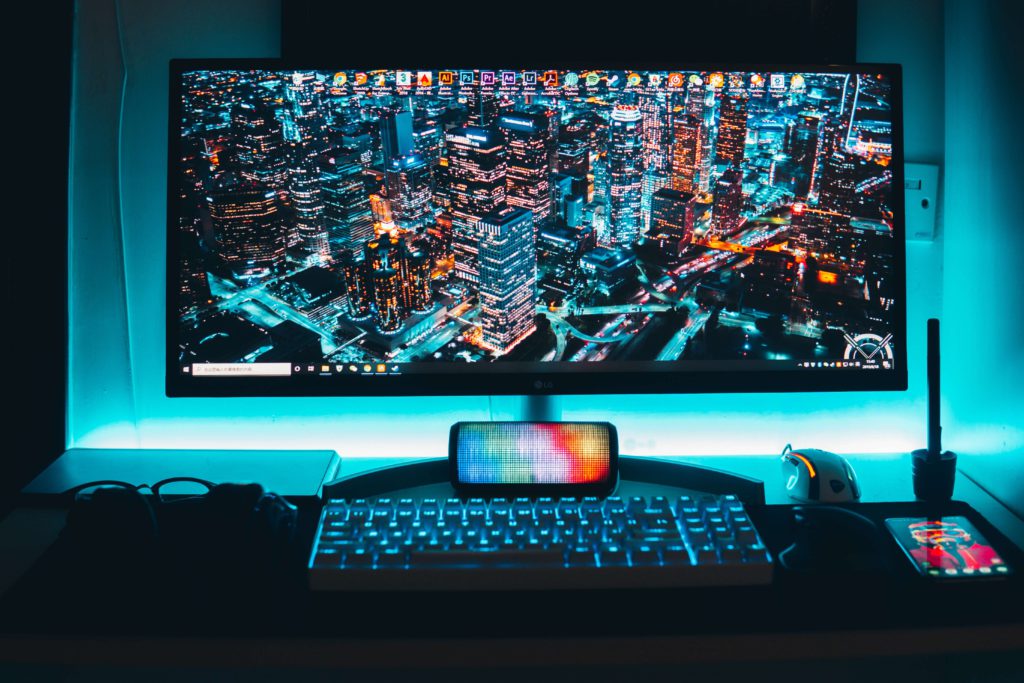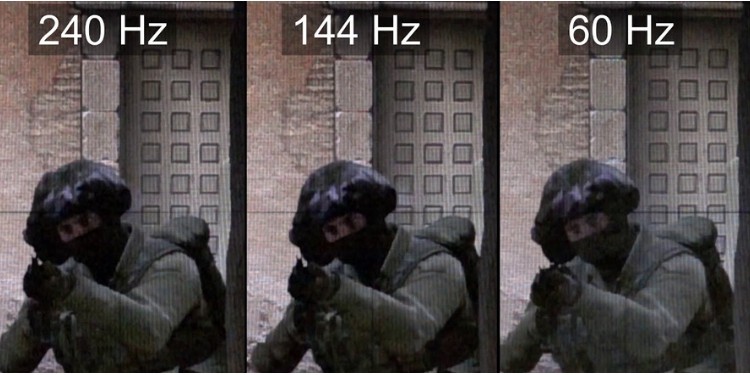If you’re looking to buy a gaming monitor, the refresh rate can be just as important as the resolution, because it refers to how often the screen updates.
We’ve already taken aim at the differences between 60Hz, 120Hz, 144Hz and 240Hz monitors to unearth which one is best for gaming and we’re back with another question: is it worth going for 144Hz or 240Hz? We’ve put together a bunch of info with our findings below, so take a look and decide whether there’s any value for you in jumping up to the next appeal point.

Are you planning to buy a gaming monitor? After all, a great gaming experience depends on many factors: the graphics card, the processor and a fantastic display. And if you think that this is an peripheral that you can choose without thinking too much about it, you couldn’t be more wrong. Just one small detail in the specs of most gaming monitors — the refresh rate — influences massively how your games look and feel.
What is the best refresh rate for a gaming monitor?
Most modern monitors, especially the ones designed for gamers, offer refresh rates in the range of 60 Hz to 144 Hz. The higher the refresh rate, the smoother your gameplay will be. However, not all framerates (that is, frames per second) are equal: While two different games may run at 60 fps each, one may show more detail than the other.
You will probably want to have a monitor with at least 75 Hz if you’re into competitive online games, but 144 Hz is best for all scenarios if your budget allows it (more on this in a bit).
A monitor’s refresh rate is directly tied to the frames per second (FPS) you’re able to achieve. The higher the action on your screen, the lower your FPS will drop, so the faster your refresh rate, the more responsive your game will feel. In competitive PC games like Counter-Strike: Global Offensive, or Overwatch, every fraction of a second counts.
Do you know What Monitor refresh rate and What is freesync?
Paired with a 144Hz monitor you can see a clear difference between high and low refresh rates. We recommend a minimum of 144Hz as the standard, and even then we still suggest pushing up to 165Hz for an even better gameplay.
Do I Need Over 60 Hertz?
Many gamers are still confused about the benefits of a 144Hz versus a 60Hz monitor. While the general consensus for a long time has been that anything less than 144 pixels per second in a fast-paced environment, such as gaming, is far too slow. More gamer-specific monitors are beginning to show that this may not be the case. As discussed above, some notable professional players have elected to use 120Hz and even 60Hz monitors for their specific genres of game.

Check out the Best Mac Monitor reviewed by themacios team.
For slow-paced games without any competition or for casual play, you can use 60Hz display.
The average person does not need a 144Hz monitor. If you are getting less than 60 FPS you can more than likely get away with using a 60Hz monitor with G-Sync or FreeSync, assuming your video card supports it. The main difference between 60 Hz and 144Hz is the black to white/off of the screen display is drastically different, with lower Hz generally looking blurrier and having a more noticeable ghosting effect (even at optimal refresh rate).
Is It Worth Going For 144Hz Or 240Hz?
The question of whether to go for a 144Hz or 240Hz monitor has been around for years. Gamers have different needs and have different preferences. Some like 144Hz because it is easy on the eye, and it is good enough for gaming. Other gamers are into competitive gaming, and prefer 240Hz monitors just because they want to be one step ahead of their opponents.

If you’re looking to play at higher refresh rates, such as 144Hz or 240Hz, then the jump between 1080p and 1440p is relatively small. We continue to advise users that you need a strong system for higher refresh rate monitors – we know from experience that you won’t get 60FPS at 4K on some games unless you have a monster system.
Is 144Hz good for gaming?
If you play competitive games you might just want to get yourself a 144Hz gaming monitor. This display technology provides you with a more enjoyable and responsive gaming experience, you’ll also be able to spot things such as enemy movement or the reloading animation in Counter Strike before your opponents do!
You’ll get an edge over others who have regular 60Hz displays because your screen updates 144 times per second as opposed to 60. With minimal input lag and game smoothness.
You’ll find 144Hz monitors already available in many computer stores, ranging from the under $200 size of 24″ to 32″, up to 2K resolutions for around $400. The UK has been seeing a lot of TN Film panels given an upgrade with a 144Hz refresh rate, but this is less than ideal when it comes to gaming. IPS and VA panel types on the other hand offer much better color reproduction, which greatly benefits the millions of PC gamers who still use a desktop monitor for their entertainment needs.
Which is better 60Hz or 120Hz?
120Hz technology refreshes the panel 120 times every second. In turn, this creates smoother motion scenes, which also helps create a more comfortable gaming experience. The images on a 120Hz monitor are sharper and clearer than on a 60Hz monitor. It may not be evident from watching movies on a 60Hz monitor, but when playing fast-paced games on a 60Hz or 120Hz monitor, you will see the difference immediately.
Is 240Hz better than 144Hz?
There is no denying that 240Hz monitors are some of the best choices for gamers. They are more responsive, quick, and have a smoother animation in-game, giving you a big advantage over the competition. However, if you are just starting out or don’t play competitive games, there is no reason to shell out more money for high-end gaming gear such as these monitors.
240Hz monitors are made for competitive games and serious gamers. They have a significantly faster refresh rate than 144Hz monitors, but they are twice as expensive. If you’re just starting out, or you aren’t the best gamer in the world, 144Hz will be more than enough for you to enjoy the game. If you do convince yourself that you need a 240Hz monitor, then choose one from ASUS.
The difference between 240Hz and 144Hz monitors is not that big for ordinary gamers. For the most part, even 120Hz monitors will give you an edge over players playing on 60Hz monitors. So if you are looking for the best gaming monitor but don’t play competitive games, we have reviewed some of the highest-rated gaming monitors under 200 dollars, that will certainly boost your in-game performance.
Can 60Hz run 120fps?
Monitor refresh rate affects the overall frame rate of a game, so no matter how powerful your hardware is, a 60Hz monitor cannot exceed the maximum frame rate of 60 frames per second. For example, if you have a console that can output both 1080p and run at 120FPS, when plugged into a 60Hz monitor it will always run games at 60FPS or below.
Conclusion
A slow panel is likely to hinder your gaming experience, as your GPU is the limiting factor while gaming. A slow monitor will result in delay; the effect of this being that the fast-paced games you play are going to be slowed down by a fraction of their speed.
If you are an enthusiast or just a competitive gamer, then it could certainly be worth the investment. For those that are serious about PC gaming and want something a little more than just eye-candy, then I’d imagine they are looking at the 144Hz and above category. And if this is you, it may be worth investing in the market leaders like Asus ROG Swift or Acer Predator Monitor.
If you want a monitor that displays the clearest images that look good and are visible, then don’t buy 144Hz or 240Hz monitors. These high refresh rates are meant for competitive gaming with most eSports titles preferring a monitor with a higher refresh rate. If you’re not competitive and just want the best visuals, then I suggest going with a standard 60Hz monitor.
